(from the Alphonsian Academy blog)
Desmond Tutu (1931-2021), a human being, South African, husband, father, clergyman, theologian, and activist, is one of those presences that are not forgotten, that mark life because they make history. From humble and Christian origins, he followed paths and made choices that marked his existence and allowed him to leave significant traces.
He was the first black South African bishop to be ordained in the Anglican Church of South Africa. He was a Nobel Peace Prize winner (1984). He worked committedly in different social and ecclesial organisations, always giving the maximum of himself and from a key that was always actively prophetic in favour of the gospel of dignity and justice. He acted so in every cause that defended not only his “black” brothers and sisters but also humanity itself in its various needs for liberation.
Human rights, one could say, have always been the cause of his efforts, and to them, he has devoted all his strength and inspiration. Not only was he – as he used to say – “the voice of the voiceless”, but he was an inspiration for other voices to make themselves heard in different historical scenarios, always in favour of human dignity and fundamental rights. He knew that in these matters, one could not be “neutral” because the harsh reality always calls for taking positions without ambiguity or indifference. This is his great testimony and legacy. He walked side by side with Nelson Mandela to help rebuild society without racial divisions in South Africa lacerated by the apartheid regime (1944-1991). He is the same man who would also say that he “would not worship a God who was homophobic” because nothing can be a justifiable cause for dividing and excluding human beings.
As is often the case with people of such notoriety and real and concrete commitment, there will be no shortage of criticisms, depending on where you look at him. They will point out, for example, that he has received awards (with significant sums of money) that have entailed certain defences of political and socio-cultural positions that did not please everyone. That may be so, but he cannot be criticised for not having played the game, and he who plays his life on the field of history gets muddy, unlike those who pretend to be uncontaminated on the podiums of absolute coherence, beyond good and evil and setting themselves up as implacable judges of others.
The great Mandela once said of him: “When I met Archbishop Tutu, I embraced him in a big hug. Here was a man who had inspired a whole nation with his words and his courage, who had revived the hopes of the people in their darkest hour”[1]. He was an advocate and proponent of the so-called Black Theology, a way of reflecting differently on the same revelation of God but giving it the possibility of going beyond the partial commonplaces with which irreconcilable positions with the God of Jesus were defended[2]. Because for him, the question was: “We must denounce, even if we suffer for it. It is not about politics but about the gospel of Jesus Christ, the liberator (…); we cannot remain silent because if we do, even the stones will cry out. Let us be the Church of God that proudly proclaims his gospel”[3]. May this memory of him remain alive in the conscience of a humanity that does not give up in its quest to be more human each day[4].
Fr. Antonio Gerardo Fidalgo, C.Ss.R.
Footnotes:
[1] Nelson Mandela, El largo camino hacia la libertad, Aguilar, Madrid 20102, 587.
[2] Cf. Desmond Tutu, «¿Por qué negra? Una defensa de la Teología Negra», en J. Allen (ed.), Desmond Tutu. Dios no es cristiano y otras provocaciones, Desclée de Brouwer, Bilbao 2012, 113-126; Id., «Black Theology/African Theology, Soul Mates or Antagonist?», en G. Willmore – J. Cone (eds.), Black Theology. A Documentary History, vol. 1, Orbis Books, Maryknoll 1979, 483-491.
[3] D. Tutu, Crying in the Wilderness, Eerdmans, Grand Rapids 1982, 30-31.
[4] Cf. Tinyiko Maluleke, «Tutu in Memory, Tutu on Memory. Strategies of Remembering», en Missionalia 47/2 (2019) 177-192.






